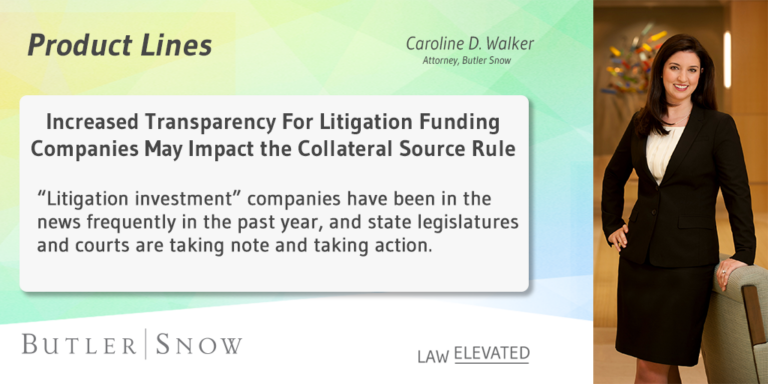“Litigation investment” companies have been in the news frequently in the past year, and state legislatures and courts are taking note and taking action.
Within the past month, Wisconsin Governor Scott Walker signed into law legislation that requires all third-party litigation funding deals to be disclosed—even if the parties to a lawsuit have not issued formal discovery requests for that information. This law is the first of its kind, but the U.S. Chamber of Commerce’s Institute for Legal Reform, which has advocated for this initiative, has suggested that additional states could soon follow Wisconsin’s lead.
Although courts have long held that litigation funding agreements are confidential, that position may be changing. Last year, the Northern District of California amended its Standing Order to require disclosure of third party funding arrangements in class action lawsuits. Additionally, a proposal to amend the Federal Rules of Civil Procedure to require third party litigation funding disclosure is currently under review. Further, a Delaware court last month held that defendants in a commercial litigation suit had the right to view email communications between a plaintiff suing them for patent infringement and the hedge fund that lent the plaintiff millions of dollars to pursue the suit.
Now the Eleventh Circuit has also held that litigation funding arrangement are admissible at trial, at least within a limited context. In its recent decision in Houston v. Publix Super Markets, Inc., the Eleventh Circuit held that the district court did not err in admitting evidence at trial regarding payments made by a litigation funding company to the plaintiff’s treating physicians.
In Houston, the plaintiff alleged that she was seriously injured when she slipped and fell in the dairy aisle of a Publix grocery store in McDonough, Georgia. During discovery in this case, defendant Publix learned that litigation funder ML Healthcare had contracted with the plaintiff’s treating physicians to provide medical care to the uninsured plaintiff. Under the arrangement, ML Healthcare would purchase the medical debt incurred by the physicians in treating the plaintiff at a discounted rate. However, ML Healthcare retained the right to fully recover the costs of medical care provided to the plaintiff out of any subsequent settlement or judgment she received. The treating doctors with whom ML Healthcare entered into this arrangement testified at trial regarding the extent and cause of the plaintiff’s medical injuries.
Generally, under Georgia law, the collateral source rule provides that a tort plaintiff is entitled to recover funds incurred in relation to injuries allegedly caused by the defendant, even if the expenses for those injuries have already been reimbursed to the plaintiff by her insurer or another non-defendant. The effect of the collateral source rule “stated simply, is that the receipt of benefits or mitigation of loss from sources other than the defendant will not operate to diminish the plaintiff’s recovery of damages.” Polito v. Holland, 258 Ga. 54, 55 (1988). Accordingly, evidence that the plaintiff has recovered funds for her injury-related expenses is generally not admissible “if the only proposition for which it is offered is in reduction of damages . . . .” Id. at 56.
However, defendant Publix argued to the district court that it sought to admit evidence of the relationship between the plaintiff, her treating physicians, and the third party litigation funder not for the purposes of reducing damages, but rather to show that the plaintiff’s doctors’ testimony was biased and that the plaintiff’s claimed medical expenses were unreasonable. The district court agreed that evidence concerning payments made by ML Healthcare to the plaintiff’s treating physicians could be admitted for the limited purpose of (1) attacking the credibility of the causation opinions proffered by the plaintiff’s doctors, and (2) challenging the reasonableness of the plaintiff’s claimed medical expenses. The Eleventh Circuit affirmed, writing that “[t]he fact that the evidence [of ML Healthcare’s contract with the physicians] also implicates the collateral source rule does not render it irrelevant for impeachment purposes.” Houston v. Publix Super Markets, Inc., No. 15-13851 at *15 (11th Cir. Feb. 7, 2018) (order affirming decision of district court) (internal citations omitted).
Although evidence of reimbursement for medical injuries associated with an alleged tortious act have long been off-limits for practitioners in states that apply the collateral source rule, this may be changing. Given the rise of litigation funding companies in personal injury lawsuits, defense counsel would be wise to request information about funding sources in formal discovery requests, and to consider whether such arrangements could have incentivized testimony from the plaintiff’s treating physicians or inflated the cost of medical care provided to him or her.
